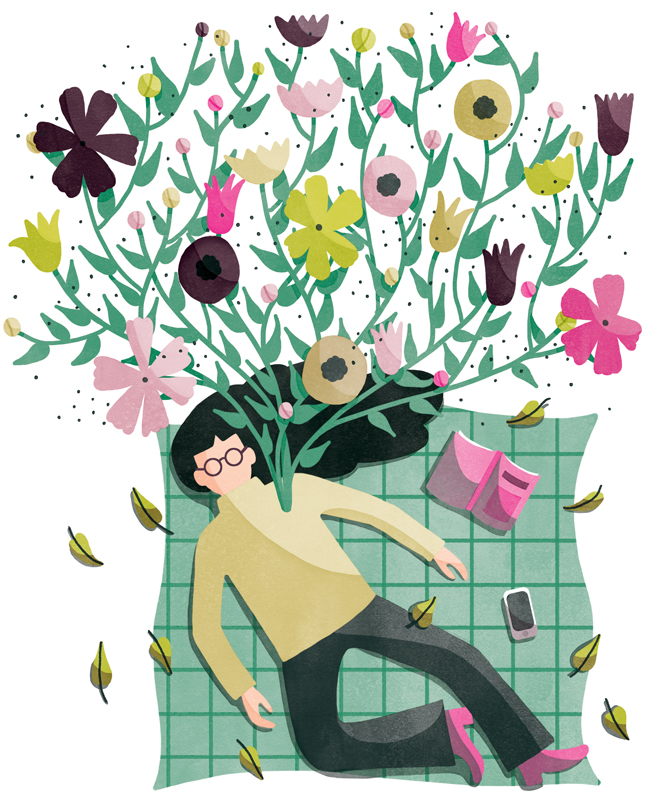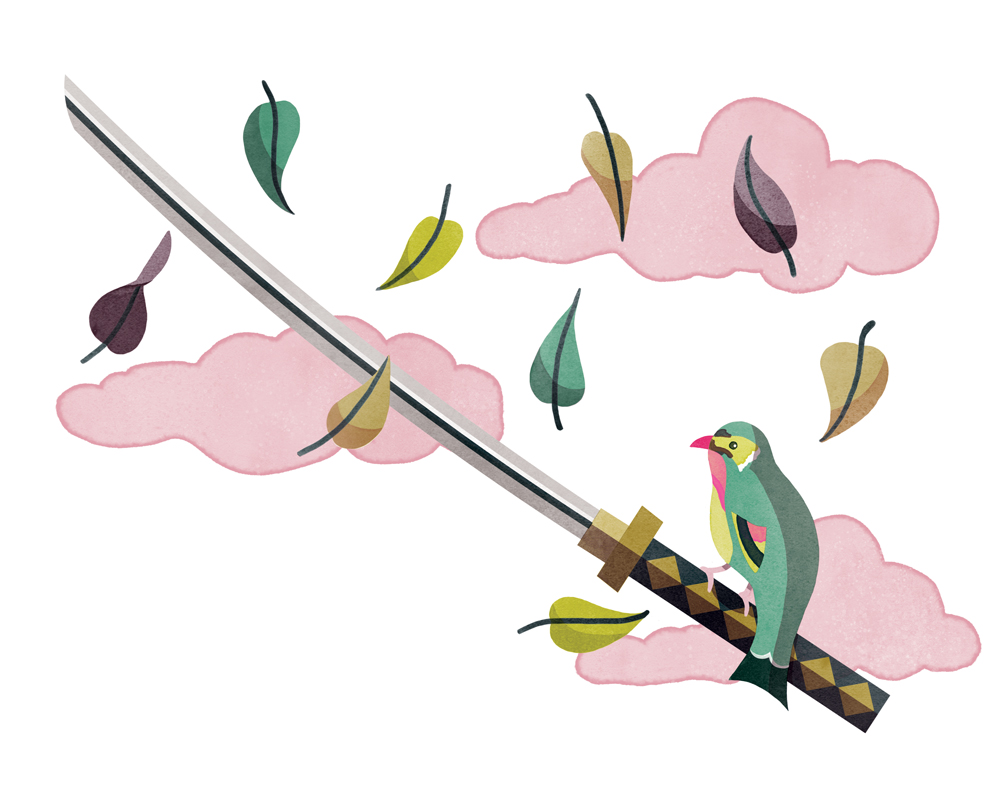
DIANE MUSHO HAMILTON
Our relationships can be more trustworthy when we learn to address our differences, even though it can be awkward or stressful until we learn how. A conversation that attempts to acknowledge and affirm difference, even when we can’t negotiate it away, flatten it, or get rid of it, is a firm stepping-stone toward more freedom and trust in all relationships.
From The Zen of You and Me: A Guide for Getting Along with Just About Anyone, by Diane Musho Hamilton © 2017. Reprinted with permission of Shambhala Publications. shambhala.com. Diane Musho Hamilton is a mediator and Zen teacher who received transmission from Genpo Merzel Roshi.
CHRISTINA FELDMAN
There is an old Chinese saying, “Write your sorrows in sand and etch your joys in stone.” It is an invitation to us to reverse the corrosive pattern that inclines us to write our joys in sand, easily forgotten, and to etch our sorrows in stone. Mindfulness teaches us to reclaim our capacity for appreciation. We learn to cultivate many moments when we pause, step out of our busyness and our stories, and truly see what is before us, to listen wholeheartedly, to be touched, and to make room for joy. We sit in meditation, caring for what is broken and difficult in our bodies and minds, and learn to give equal attention to all that is well. We learn to notice the moments in our day when our hearts are not governed by agitation or clinging. Brushing our teeth, we simply brush our teeth. We bring a singular attention to eating, to walking, to feeling the touch of the breeze on our cheek, and we sense the ease, the sense of appreciative joy, in those moments. Rather than glossing over the small acts of generosity we offer, the small words of gratitude and kindness we speak, and the gestures of care we engage in, we learn to honor and celebrate those moments, discovering a taste of joy.
Appreciation rests upon reclaiming an innocence of perception. We see a small child chortling with delight while holding a wriggling worm in his or her hand for the first time, endlessly fascinated with jumping the same step over and over, and we marvel at a child’s capacity for wonder. Joy is concerned with reclaiming that capacity within ourselves, to be able to see anew. It is so clear to us that when our eyes are tired, the world appears bleak. When our hearts are jaded and desensitized, the world becomes colorless and flat. The sensitive, mindful heart perceives value and worth in all things. It does not rely upon drama or intensity to feel awake and alive, but draws upon receptivity, stillness, and a present moment wholeheartedness.
From Boundless Heart: The Buddha’s Path of Kindness, Compassion, Joy, and Equanimity, by Christina Feldman © 2017. Reprinted with permission of Shambhala Publications. shambhala.com. Christina Feldman is a guiding teacher at Insight Meditation Society and cofounder of Gaia House in England.
PASCAL FAULIOT
The Yagyu were the masters of arms of the Tokugawa shoguns for several generations.
One gorgeous afternoon in springtime, when he was practicing with the sword, Yagyu Tajima no Kami said to one of his sons:
“One thing is sure: you’re not good for anything today. Are you distracted or what?”
“No, Father. Just the opposite. I’m all concentration. My mind is completely concentrated on my sword. I am not letting any extraneous thoughts distract me.”
“While we were sparring, did you hear the song of the nightingale?”
“No.”
“That’s just what I thought. You still haven’t understood what real concentration is.”
“What are you talking about!?”
“If the mind is aimed in just one direction, it becomes its own obstacle and is unable to respond to all situations. That is what was so well expressed in the poem of our great Zen master, Takuan Soho:
If you look at one leaf
You only see that.
If you don’t look at any of them
The whole tree appears.
From Samurai Wisdom Stories: Tales from the Golden Age of Bushido. English translation © 2017 by Shambhala Publications. First published in France under the title Contes des sages Samouraï, by Pascal Fauliot © 2011, Editions du Seuil. Reprinted with permission of Shambhala Publications. shambhala.com. Pascal Fauliot is a martial arts teacher and author.
PEMA CHÖDRÖN
Be grateful to everyone.
Others will always show you exactly where you are stuck. They say or do something and you automatically get hooked into a familiar way of reacting—shutting down, speeding up, or getting all worked up. When you react in the habitual way, with anger, greed, and so forth, it gives you a chance to see your patterns and work with them honestly and compassionately. Without others provoking you, you remain ignorant of your painful habits and cannot train in transforming them into the path of awakening.
From The Compassion Book: Teachings for Awakening the Heart, by Pema Chödrön © 2017. Reprinted with permission of Shambhala Publications. shambhala.com. Pema Chödrön, a Tibetan Buddhist nun and former student of Chögyam Trungpa Rinpoche, is the principal teacher at Gampo Abbey, in Nova Scotia.
VALERIE MASON-JOHN
Our hearts could be described as huge muscles that open and close, shrivel and expand, soften and harden, love and hate. We have to work diligently to keep our hearts open, just as we have to work to keep other muscles in the body strong. Purifying our hearts is an ongoing process, like physical exercise. It is, as the poet Galway Kinnell writes, necessary to “reteach a thing its loveliness.”
From Detox Your Heart: Meditations for Healing Emotional Trauma, by Valerie Mason-John (Vimalasara) © 2017. Reprinted with permission of Wisdom Publications. Valerie Mason-John is ordained in the Triratna Buddhist Community and is a resident teacher at Vancouver Buddhist Center.

THUBTEN CHODRON
When you think about it, a tranquil mind is the effect of ethical conduct and also the cause of ethical conduct. The two are cause and effect for each other: when our mind is tranquil, then there aren’t rampant afflictions, so we don’t have the motivation to break our precepts or to create destructive actions because the mind’s already peaceful, it’s in a good state. When we keep ethical conduct, then the result is also a tranquil mind, because we aren’t plagued by regret and remorse, or even going into deluded guilt. Do you see how that works? How it goes both ways? This is very important to realize, because sometimes we think, “Oh, a tranquil mind means I’m just kind of spaced out, not thinking about anything,” or “I just had some blissful experience….” Yes, that makes us tranquil temporarily, but if we want to know how to have a tranquil mind in our daily lives, ethical conduct is the way to do it.
From “The Best Ethical Conduct,” a video teaching by Thubten Chodron. Published on thubtenchodron.org. Thubten Chodron is a Tibetan Buddhist nun and the founder of Sravasti Abbey in Newport, Washington. sravasti.org.
TUERE SALA
It’s not enough to simply hear the teachings of the Buddha, even if they resonate with you. There’s still a requirement to apply those teachings in your actual, ordinary life. So we take refuge in the dharma, which is applying those teachings.
It means investigating the nature and essence of our difficulty, even in the challenges that we face around injustice, or racism, cruelty, or isolation. Regardless of the difficulty, regardless of the stimulus, we investigate. It’s not about denying the validity of our suffering. It is not about denying the existence of our suffering, nor does it require us to feel a certain way. It’s simply about looking deeply into the nature of what it is we are experiencing, and seeing for ourselves where the cause of that suffering lies.
From Tricycle’s video series “Teachings for Uncertain Times,” screening at tricycle.org in February in honor of Black History Month. Tuere Sala is a retired prosecuting attorney and a guiding teacher at Seattle Meditation Society.
